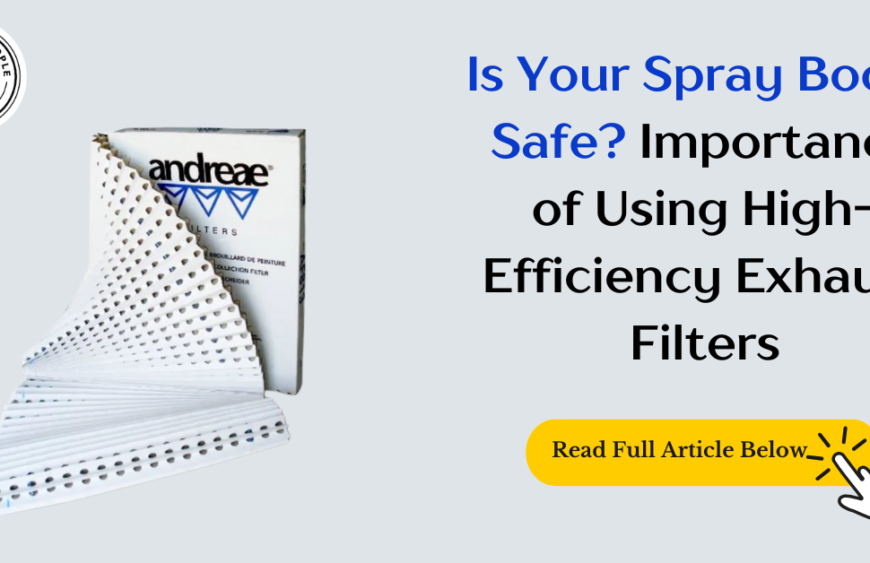When it comes to spray painting—whether you’re a seasoned professional or a passionate hobbyist—the safety of your spray booth is paramount. You invest in quality equipment to achieve that perfect finish, but have you ever stopped to consider if your spray booth is truly safe? One critical component that often gets overlooked is the exhaust filter. In this post, we’ll dive into the importance of high-efficiency exhaust filters, how they work to protect you and your workspace, and practical tips to ensure your spray booth operates at its best.
Understanding Spray Booth Safety
Spray booths are designed to control overspray, fumes, and airborne particles that occur during painting. But with these benefits come risks. Paint fumes and particulates can be hazardous if not properly managed. That’s why safety isn’t just about the booth’s structure—it’s also about the systems in place to clean the air you breathe.
Common Hazards in Spray Booths
Before we delve into filters, it’s essential to understand the hazards:
- Chemical Exposure: Many paints contain volatile organic compounds (VOCs) and other chemicals that can cause respiratory issues or long-term health problems.
- Fire Risk: Paint overspray combined with fumes can create a flammable environment if not properly ventilated.
- Particulate Matter: Fine particles can settle on surfaces or be inhaled, posing both health risks and quality issues in your finished product.
Knowing these hazards reinforces why an efficient exhaust system isn’t just a nice-to-have—it’s a must-have.
What Are High-Efficiency Exhaust Filters?
High-efficiency exhaust filters are specially engineered to capture and remove harmful particles and contaminants from the air in your spray booth. Unlike standard filters, high-efficiency options offer several advantages that make them indispensable in a professional or even a home setting.
How They Work
At the heart of these filters is advanced media designed to trap even the smallest particulates. Here’s a quick breakdown:
- Multi-Layer Filtration: These filters often employ a combination of pre-filters and HEPA-like media that capture large particles first, then trap finer particles in subsequent layers.
- Durability and Efficiency: Made from materials that resist degradation from chemical exposure and high temperatures, high-efficiency filters maintain performance over time.
- Optimized Airflow: Despite their dense filtering media, these filters are engineered to ensure proper airflow, which is crucial for maintaining a consistent environment inside the booth.
For instance, the Andreae AF813 Standard Exhaust Filter is a real-world example that demonstrates the balance between robust filtration and optimal airflow. Products like this have been tried and tested by professionals who rely on them daily for both safety and performance.
The Benefits of Using High-Efficiency Exhaust Filters
Investing in a high-efficiency exhaust filter can transform your spray booth experience in multiple ways. Let’s explore the key benefits:
Enhanced Health and Safety
- Cleaner Air: By trapping VOCs, chemicals, and particulates, these filters significantly reduce the amount of hazardous materials you and your team are exposed to.
- Fire Prevention: Efficient removal of flammable overspray and fumes minimizes the risk of accidental ignition.
- Regulatory Compliance: Many local and national regulations require strict control of emissions. High-efficiency filters help you meet these standards, ensuring a safer work environment.
Improved Painting Quality
- Consistent Finish: A clean environment means fewer contaminants that can affect the texture and finish of your work.
- Reduced Rework: By maintaining a particle-free space, you’re less likely to encounter issues like dust or debris settling on your freshly painted surfaces.
- Optimal Performance: With steady airflow and minimal contamination, your equipment can operate at peak performance, leading to more efficient processes and better results.
Cost-Effectiveness in the Long Run
- Lower Maintenance Costs: A cleaner booth reduces the wear and tear on your equipment. When contaminants are minimized, you avoid the frequent cleaning and maintenance that can drive up operational costs.
- Longevity of Equipment: High-efficiency filters help protect not just your health but also the longevity of your spray booth and painting equipment by reducing the buildup of harmful residues.
Real-World Examples and Expert Insights
I’ve seen firsthand how a high-efficiency exhaust filter can change the game. One workshop owner, for instance, had persistent issues with dust and overspray affecting the quality of their work. After upgrading to a high-efficiency filter system, not only did the paint finishes improve dramatically, but the team also noticed a significant decrease in respiratory complaints.
Expert Tip: Ask Yourself These Questions
- Are you experiencing recurring issues with your finish quality?
- Have you noticed an increase in maintenance needs or equipment wear?
- Is there a consistent musty or chemical odor in your workspace?
If you answered yes to any of these, it might be time to assess whether your current filtration system is up to the task.
Industry Voices
Experts in the field stress the importance of maintaining a clean working environment. One industry veteran commented, “A spray booth is only as good as its ventilation system. Investing in high-efficiency filters is investing in the health of your team and the quality of your work.” This sentiment echoes throughout the painting community—safety and quality go hand in hand.
Tips for Maintaining Your Spray Booth
Even the best filters require proper care to function effectively. Here are some practical tips:
Regular Inspection and Replacement
- Scheduled Checks: Create a routine inspection schedule for your filters. Look for signs of wear, clogging, or reduced airflow.
- Replacement Guidelines: Follow the manufacturer’s recommendations for filter replacement. Don’t wait for performance issues to become noticeable; proactive replacement can save you time and money.
Clean Your Workspace
- Dust and Debris Control: Regular cleaning of your spray booth helps extend the life of your filters and ensures the system operates at peak efficiency.
- Maintain Equipment: Ensure that all ventilation components are functioning correctly. A well-maintained system complements the work of your high-efficiency filters.
Monitor Air Quality
- Use Air Quality Monitors: Investing in air quality monitoring equipment can give you real-time data on the effectiveness of your filtration system.
- Adjust as Needed: If you notice fluctuations in air quality, it might be time to recalibrate your system or upgrade your filters.
Conclusion: Keep Your Workshop Safe and Efficient
Your spray booth is more than just a workspace—it’s a vital part of your painting process that directly affects the quality of your work and the health of everyone involved. High-efficiency exhaust filters are a critical component in maintaining a safe and effective environment. They not only safeguard against harmful chemicals and particulates but also contribute to a better, more consistent finish on your projects.
By investing in quality filtration, you’re taking proactive steps to:
- Protect your health and that of your team.
- Enhance the quality of your paint jobs.
- Reduce maintenance costs and prolong the life of your equipment.
Next time you set up your spray booth, take a moment to review your filtration system. Ask yourself, “Is my spray booth safe?” If there’s any doubt, consider upgrading to a high-efficiency exhaust filter like the Andreae AF813. Your work environment—and your health—will thank you.
If you found these insights helpful, feel free to share your own experiences or ask questions in the comments below. And if you’re looking for reliable, expert-approved filtration solutions, why not explore the options available today? Safety, quality, and efficiency are just a filter away.

